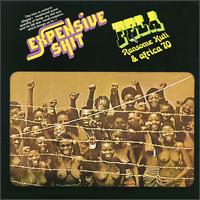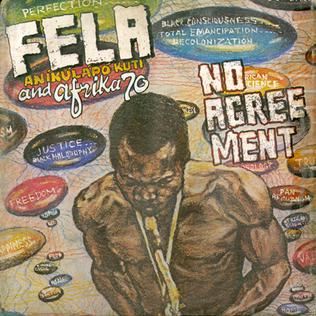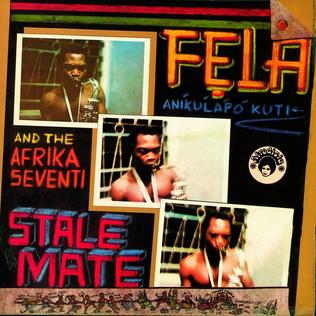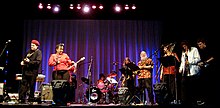
Afrobeat is a Nigerian music genre that involves the combination of West African musical styles from mainly Nigeria such as the traditional Yoruba and Igbo music and highlife with American funk, jazz, and soul influences. With a focus on chanted vocals, complex intersecting rhythms, and percussion. The style was pioneered in the 1960s by Nigerian multi-instrumentalist and bandleader Fela Kuti, who is most known for popularizing the style both within and outside Nigeria. At the height of his popularity, he was referred to as one of Africa's most "challenging and charismatic music performers."

Antibalas is an American, Brooklyn-based afrobeat band founded in 1998 by Martín Perna. Initially inspired by Fela Kuti's Africa 70 band and Eddie Palmieri's Harlem River Drive Orchestra, the music generally follows the musical architecture and language of afrobeat and incorporates elements of jazz, funk, dub, improvised music, and traditional drumming from Cuba and West Africa.

The music of West Africa has a significant history, and its varied sounds reflect the wide range of influences from the area's regions and historical periods.

Tony Oladipo Allen was a Nigerian drummer, composer, and songwriter who lived and worked in Paris, France. Allen was the drummer and musical director of Fela Kuti's band Africa '70 from 1968 to 1979, and was one of the founders of the Afrobeat genre. Fela once stated that "without Tony Allen, there would be no Afrobeat". He was described by Brian Eno as "perhaps the greatest drummer who has ever lived".
Afro rock is a style of rock music with central African influences. Afro rock bands and artists in the late 1960s and early 1970s included Osibisa, Assagai and Lafayette Afro Rock Band.
Yerba Buena was a Latin fusion band. The group, active between 2003 and 2009, was founded by Venezuelan musician and producer Andres Levin.
The Umoja Orchestra was a Gainesville, FL-based band whose music incorporated elements from afrobeat, jazz, funk, afro-cuban as well as traditional African, Caribbean and South American styles like salsa and merengue. The band's instrumentation was modeled closely to bands such as Fela Kuti's Africa 70 and the Antibalas Afrobeat Orchestra.

Expensive Shit is the twelfth full-length album by pioneering Afrobeat artist Fela Kuti and his Africa '70 band, released in 1975. It was reissued in 2000 by MCA Records, packaged with Kuti's He Miss Road (1975) on the same CD.

Kokolo, also known as the Kokolo Afrobeat Orchestra, is an American Afrobeat band from the Lower East Side of New York City, formed in 2001 by songwriter/producer Ray Lugo.
Cheick Tidiane Seck is a Malian musician, arranger and composer. He has written for and played with African artists including Fela Kuti, Mory Kanté, Salif Keita, Youssou N'Dour and for jazz bands. He has also collaborated with musicians Damon Albarn and Mamadou Diabate.

Cheick Hamala Diabate is a musician from Mali, West Africa, who has been nominated for a Grammy award. Using Adelphi, Maryland, as his home he travels all over the United States, Canada, Europe, and Asia. He has performed at the Kennedy Center, the United States Senate, and the Smithsonian Institution. Cheick Hamala was born into a griot family in Kita, Mali. From a young age, he learned to play the ngoni, a stringed instrument related to the American banjo. In addition, Cheick has learned the history of Mali passed down for over 800 years. Cheick has performed internationally.

Sila and the Afrofunk Experience is an Afrofunk band formed in 2003.
Gbedu literally means "big drum" and is a percussion instrument traditionally used in ceremonial Yoruba music in Nigeria and Benin. More recently, the word has come to be used to describe forms of Nigerian Afrobeats music.

No Agreement is an album by Nigerian Afrobeat composer, bandleader, and multi-instrumentalist Fela Kuti, recorded in 1977 and originally released on the Nigerian Decca label.

Stalemate is an album by Nigerian Afrobeat composer, bandleader and multi-instrumentalist Fela Kuti recorded in 1977 and originally released on the Nigerian Decca label.

Sorrow Tears and Blood is an album by Nigerian Afrobeat composer, bandleader, and multi-instrumentalist Fela Kuti recorded in 1977 and originally released on the Nigerian Kalakuta label.

Shuffering and Shmiling is an album by Nigerian Afrobeat composer, bandleader, and multi-instrumentalist Fela Kuti, recorded in 1977 and originally released on the Nigerian Coconut label.

Fela's London Scene is an album by Nigerian Afrobeat composer, bandleader, and multi-instrumentalist Fela Kuti, recorded in England in 1971 and originally released on the Nigerian EMI label.

Shakara is an album by Nigerian Afrobeat composer, bandleader, and multi-instrumentalist Fela Kuti, recorded in Lagos in 1971 and originally released on the Nigerian EMI label.

Everybody Get Agenda is the sixth studio album by Bantu, released on September 23, 2020, on Soledad Productions. Like their previous album Agberos International, this long player was composed and written by all members of the band. It was recorded in Lagos, Nigeria and mixed in Cologne, Germany. The music style is Afrofunk and Afrobeat with elements of Yoruba music, Soul, Jazz and Rap.















